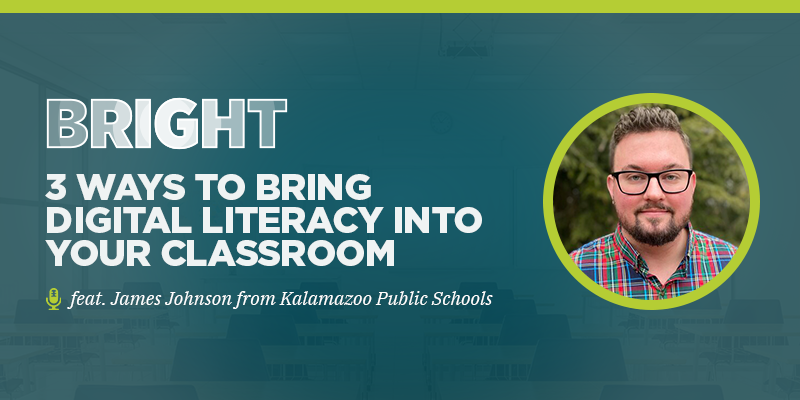Or listen on Apple, Spotify, Google, or another platform. Alternatively, you can read along with the transcript.
Digital literacy skills are no longer a luxury. They’re critical to a flourishing democracy.
In this episode of BRIGHT, I chat with James Johnson, a social studies teacher at Loy Norrix High School in Kalamazoo, who was recognized as a 2021-22 regional teacher of the year.
In this episode of the BRIGHT podcast, James shares:
- Why digital literacy skills are fundamental to civic life
- Examples of how he teaches these skills in his classroom
- Three tried-and-true tips for fellow educators.
You can listen to my conversation with James using the audio player above or by subscribing to the BRIGHT podcast in your app-of-choice (find us on Apple, Spotify, Google, and more) or by reading along with the transcript.
Of course, we understand that educators are busier than ever. If you don’t have time to listen to James’ full episode (which offers the fuller effect of his wisdom, energy, and examples), you can still benefit from a glimpse at his top three tips below.
3 ways to bring digital literacy into your classroom
#1. Build a routine around digital literacy
Classrooms have routines for almost every aspect of education — homework, classwork, discussions, tests, etc.
James’ best advice for bringing digital literacy skills into your classroom is to make a routine out of it.
Make it simple and adaptable, no matter your lesson or unit.
In James’ classroom, for example, they use the acronym S.O.A.P.S. every time they analyze primary source materials.
S.O.A.P.S. stands for sourcing, occasion, audience, purpose, and subject. An even more straightforward formula that James shares boils down to three essential questions borrowed from the website Civic Online Reasoning from Stanford University:
- Who’s behind the information?
- What’s the evidence?
- What do other sources say about this information?
At first, this process may seem tedious, but by the end of the semester, it becomes habitual.
As this routine is modeled and reinforced throughout the year, students come to expect it and become quick in applying this formula to identify an author’s potential biases.
#2. Practice what you preach
James’ second tip is more easily said than done:
Practice what you preach.
As curious and thoughtful as they are, teachers aren’t immune to bias and disinformation.
“We aren’t exempt from the algorithms or our own psychology,” says James. “We’re just as prone to disinformation or misinformation as our students are.”
Since he began teaching a current events class, James has been more intentional about incorporating digital literacy into his personal life. He’ll share anecdotes with his students about how he applies these strategies after getting fired up while browsing Twitter.
“We need to be responsible digital citizens first,” he adds, “if we expect our students to be responsible digital citizens.”
By practicing what he preaches, James builds trust with his students and demonstrates that digital literacy isn’t just something you need to do for a class: These are skills that can shape the way you browse, engage, and learn for the rest of your life.
#3. Don’t reinvent the wheel — There are tons of free resources already out there!
This one James can’t emphasize enough:
Don’t reinvent the wheel!
There are so many websites and resources out there dedicated to teaching students digital literacy skills.
Even better, many of these resources are free. Rather than creating materials from scratch, you can save a lot of time by first seeing what’s out there.
You can check out James’ list of go-to resources on digital literacy featured at the bottom of this article under “related resources.”
My favorite quotes from this episode
“Reliable information is to civic health what clean water and proper sanitation are to public health. Never has so much information been at our fingertips as it is today. Whether this bounty will make us smarter and more informed or more ignorant and narrow-minded will depend on one thing: Our educational response to this challenge.” (quoted from Sam Wineberg of Civic Online Reasoning)
“It’s in our nature to defend our position, whether it’s something serious, like a political debate, or something sillier or more entertaining.”
“One thing we know about social media and the internet is that these programs have computer algorithms that learn about our preferences and then cater those digital experiences to match our patterns. So if someone starts gravitating toward disinformation, they can quickly wind up in a feedback loop or echo chamber. They need digital literacy skills then to evaluate this information.”
“Without sounding overdramatic, I think our democracy is at stake. If we don’t teach these skills, then people don’t realize how the systems work and how their own psychology works. That’s how disinformation spreads. When disinformation spreads, it influences our policies, and that can spiral very quickly. I don’t want to sound overdramatic, but I do think these skills are essential to keeping our country going.”
Related resources
- Explore: Civic online reasoning
- Explore: Stanford history education group
- Explore: Research learning modules
- Watch: Crash course videos
- Explore: ReadWriteThink
- Explore: C3Teachers
- Read: Why learn history (when it’s already on your phone) by Sam Wineburg
- Explore: Checkology

